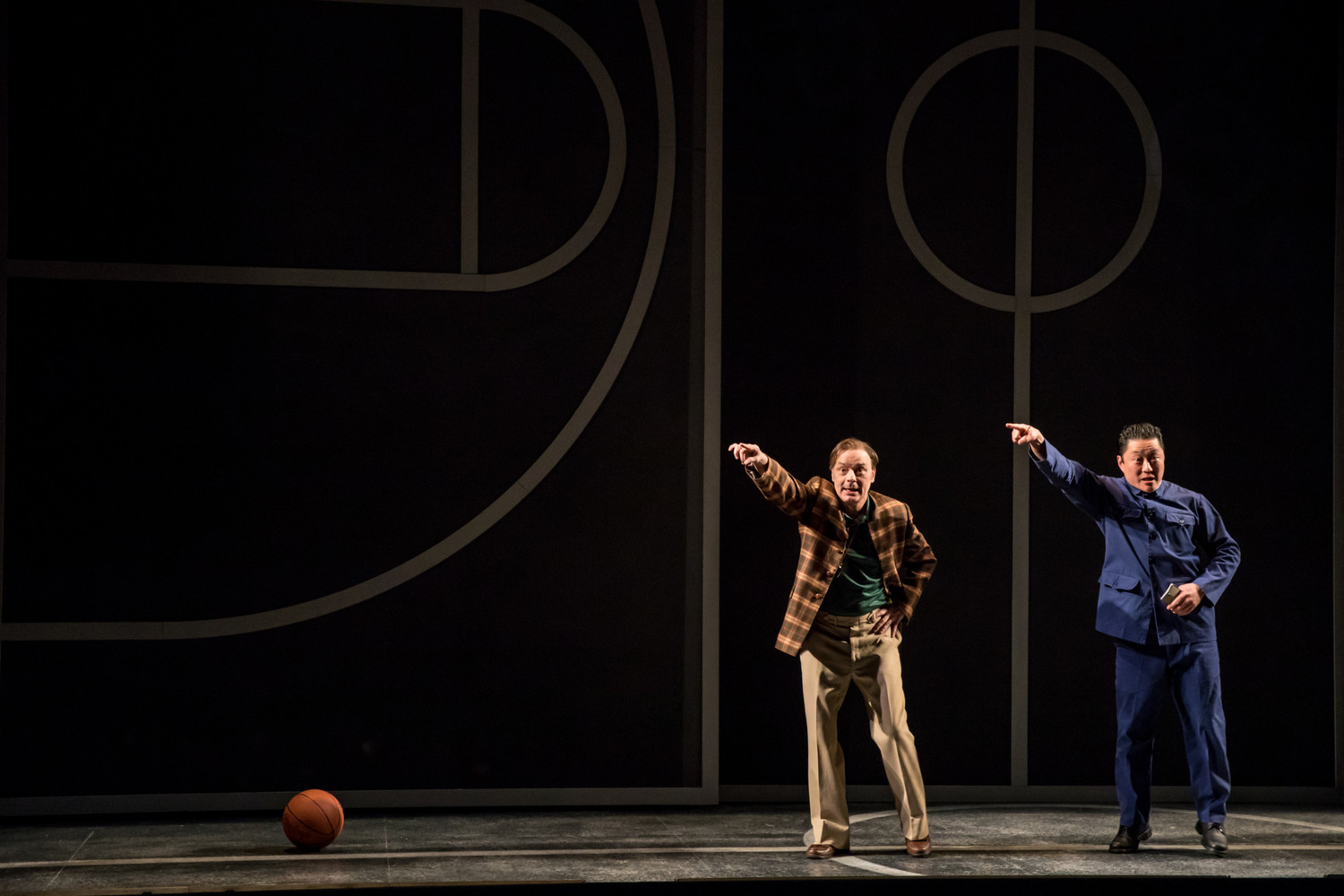Review: THE GREAT LEAP Just Misses at Guthrie Theater
 Lauren Yee is a talented playwright, with an ear for fast dialogue and a knack for creating pithy lines that work on several levels. This skill is clear in THE GREAT LEAP, her play about family and cross-cultural sports diplomacy now on the big proscenium stage at the Guthrie. Not only does the title have a dual meaning, but a number of other lines pop up repeatedly, sometimes with literal heft and sometimes with metaphoric implications. While the piece traverses some promising thematic terrain, it is too choppy and a little too predictable to work fully.
Lauren Yee is a talented playwright, with an ear for fast dialogue and a knack for creating pithy lines that work on several levels. This skill is clear in THE GREAT LEAP, her play about family and cross-cultural sports diplomacy now on the big proscenium stage at the Guthrie. Not only does the title have a dual meaning, but a number of other lines pop up repeatedly, sometimes with literal heft and sometimes with metaphoric implications. While the piece traverses some promising thematic terrain, it is too choppy and a little too predictable to work fully.
THE GREAT LEAP was the name of one of the most draconian 5 year plans during the Cultural Revolution in China; it also suggests the soaring athleticism of star basketball players who dunk the ball. Basketball was introduced to China by Western missionaries well before the Communist period. Apparently, it was the only Western sport not banned in China under Mao Zedong. The communist dictator loved the game, and saw it as requiring group collaboration and collective action: long-standing Chinese values. So there were exhibition matches between US and Chinese teams even during the height of the anti-capitalist period in China.
Lauren Yee's father played in such a game in the 1980s. Born in the US of immigrant parents, his story is one of the sources of this play, which also trades in some speculative history around the Tiananmen Square protests of 1989, known widely in the West for a famous photo that has come to be called Tank Man.
This provides historical grounding to THE GREAT LEAP, which takes place in 1971 and in 1989, and has scenes set both in San Francisco and in Beijing. These time and location jumps are responsible for the play's necessarily choppy structure of short scenes that bounce around. We can track where and when each scene happens thanks to large projections, but the effect is still disorienting.
That in itself may be intentional, since the cross-cultural experiences of all four characters certainly cause confusions for each of them. Central to the action are two coaches.
Saul (Lee Sellars) is an extremely foul-mouthed Jewish American who coaches the University of San Francisco team. When Saul comes to China in 1971 to coach the Chinese basketball team, Wen Chang (Kurt Kwan) is assigned to him as translator. He's just 25, and has just been plucked from a collective farm where he had been undergoing re-education for only one reason: he has superb formal English. He's learned it in part by listening to an audio book of Dickens' Tale of Two Cities; you know, the one that begins 'It was the best of times, it was the worst of times...'. That's another example of playwright Yee's ear for the telling phrase.
The other two characters are Manford (Lawrence Kao), a young Chinese-American basketball player who desperately wants to talk Saul into including him in the team that is to play in China in 1989. Manford has a cousin Connie (Leah Anderson), really a concerned neighbor, who is recently back from a semester abroad studying in Beijing and is trying to look out for him. There's a fifth person we never meet, an offstage character who is crucial to the plot; that's the part I find just a little too predictable.
Kao brings considerable kinetic energy to his performance, the best bit of which is a short sequence of popping and locking that shows he can really dance. That's more effective than any of the basketball sequences (mostly done without a ball) at displaying his athletic prowess. (It should be said that plays featuring sports are tough to stage in any way that matches the drama of a real game.) Manford claims to be 'the most relentless person you have ever met' and that could be true. It's his insistent needs and his naivete once in China that drive the action.
Sellars as Saul verges on caricature, humanized slightly by a family back story that is laid in with some subtlety. In the only female role, and the one closest to playwright Yee's own experience, Anderson struck me as too one-note. What I like best about the text is the way it manages to juxtapose deep differences between Chinese and American cultural norms. It seems to me that the role of Connie could add some good probing complexity to that dichotomy with some tweaking. Most sympathetic is Kwan as Wen Chang; he is also the character we see undergo the biggest transformation.
In program notes, which are always a good read at the Guthrie, Yee says she admires plays that are "big, ambitious and try something new, even if the experiment goes awry." I think she's written one here. I'll be curious to catch productions of her other plays; she is frequently produced, and we need voices that delve into experiences that are neither white nor male. She has a 10 year friendship with director Desdemona Chiang, and I'm glad they are near the beginning of what I hope will be lengthy careers. Our local script incubator, The Playwright's Center, has hosted Yee twice as she worked on this play. Their confidence is not misplaced.
THE GREAT LEAP runs under two hours including one intermission. It plays through February 10.
Photo credit: Dan Norman
Reader Reviews

Videos
